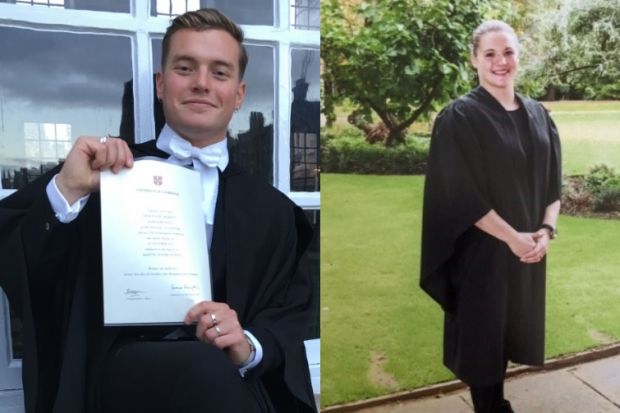Academics have emphasised the importance of higher education institutions’ involvement in prisoner rehabilitation programmes in the wake of the London Bridge terror attack.
Jack Merritt, 25, and Saskia Jones, 23, were fatally stabbed by Usman Khan at an event held by the University of Cambridge’s Institute of Criminology at Fishmongers’ Hall on 29 November.
The conference was celebrating the fifth anniversary of Learning Together, a Cambridge-run prisoner rehabilitation initiative in which students and convicts study alongside each other. Mr Merritt was a coordinator on the programme, while Ms Jones was a volunteer. Both were Cambridge graduates.
Khan, who was released from prison last December after being convicted of terrorism offences in 2012, had been invited to speak at the event about his experience of participating in the scheme. The 28-year-old, who was wearing a hoax explosive device, was shot dead by police on London Bridge soon afterwards.
A member of Cambridge staff was among three people injured.
The atrocity has sparked debate about the effectiveness of prisoner rehabilitation programmes, particularly in relation to individuals convicted of terrorism offences.
But academics indicated that universities should not be deterred from working in prisons, emphasising the value of such activity to the individuals involved and society as a whole.
Recently published research by The Open University says that studying for one of its awards behind bars results in a reduction of between 20-40 per cent in the rate of reoffending among prisoners, compared with those who did not participate.
Andy Aresti, senior lecturer in criminology at the University of Westminster, said that “it would have significant consequences for the prisoners, our communities and wider society, if this tragic event meant the closure of the prison to university pipeline initiatives”.
“These initiatives have played a critical role in helping the people that have engaged in them to consider alternatives to crime. Many have taken the path into higher education with the hope of one day, on being released, of not only living a pro-social life, but also giving back to their communities and society,” said Dr Aresti, who himself spent time behind bars after being convicted of drug offences. “For many of these people, HE is the path to a better life.”
Dr Aresti said that university work with prisoners was controlled by tight risk assessment procedures and that he had “no fear of taking my students into the prison for such initiatives”.
Stephen Seymour, the coordinator of a University of Southern Queensland initiative that provides educational content for use in Australian correctional centres where prisoners are barred from using the internet, said that universities were “involved in this because we know it makes a difference”.
“It contributes to reducing recidivism and reoffending, and it is making an impact,” said Mr Seymour, the university’s acting associate director for social justice, equity and inclusion.
Nearly all incarcerated people were released at some stage, he stressed. “They’re going to be our neighbours and we don’t want them to reoffend,” he said. “We want them to be able to contribute to society.”
Stephen Toope, Cambridge’s vice-chancellor, hailed Learning Together as a “unique and socially transformative programme”.
Loraine Gelsthorpe, director of the Institute of Criminology, said that Mr Merritt’s “passion for social and criminal justice was infectious”. “He worked tirelessly in dark places to pull towards the light,” Professor Gelsthorpe said. She added that Ms Jones’ “warm disposition and extraordinary intellectual creativity” were “combined with a strong belief that people who have committed criminal offences should have opportunities for rehabilitation”.
POSTSCRIPT:
Print headline: Vital prison role of HE highlighted after attack
Register to continue
Why register?
- Registration is free and only takes a moment
- Once registered, you can read 3 articles a month
- Sign up for our newsletter
Subscribe
Or subscribe for unlimited access to:
- Unlimited access to news, views, insights & reviews
- Digital editions
- Digital access to THE’s university and college rankings analysis
Already registered or a current subscriber? Login








